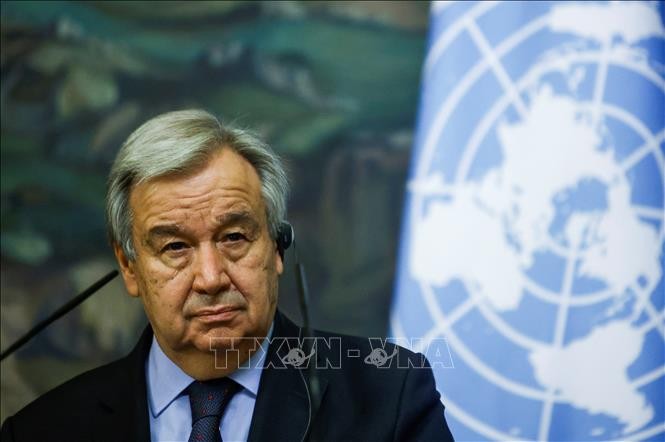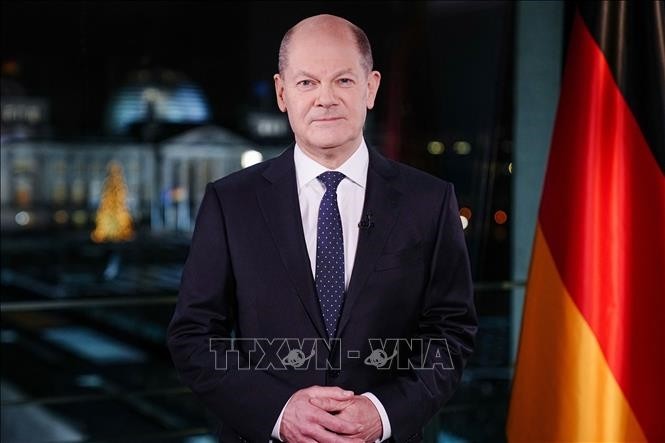(VOVWORLD) - The UN’s Summit of the Future 2024 will take place in New York on Sunday and Monday hoping to shape a fairer, more inclusive, more sustainable, and strongly connected future in the 21st century.
 UN Secretary-General António Guterres (Photo: AFP/VNA) UN Secretary-General António Guterres (Photo: AFP/VNA) |
The UN raised the idea of holding a summit to discuss the world’s future on its 75th founding anniversary in 2020 at a time when the COVID-19 pandemic had awakened the world to the need to comprehensively change the global governance model in the 21st century.
A new world
UN Secretary-General António Guterres last week delivered a global call to action in the face of new challenges that are increasingly diverse and complex. He emphasized that current institutions cannot keep up with the changing times and challenges of the 21st century, such as climate change and the impact of technology. Therefore, the Summit of the Future will discuss a new world with new structures and new priorities.
The UN’s ambition has received strong support from many member states, especially developing countries in Asia, Africa, and South America, who are demanding a greater voice in multilateral mechanisms.
Namibian President Nangolo Mbumba said: "We stand at a crossroads in history. The challenges we face, from climate change to global inequality, from geopolitical tensions to the need for urgent implementation of the 2030 Agenda for Sustainable Development require rigorous collective commitment. The future of the United Nations hinges on our ability to act as a more inclusive, effective, and innovative platform."
Some western countries, who benefit the most from the current world order, also accept the need to change. German Chancellor Olaf Scholz said: "Any effective international order needs to reflect the world’s multipolarity. Countries in Asia, Africa and the Americas have growing populations and economies. Hundreds of millions of people globally have lifted themselves out of poverty and joined the global middle class. They have every right to the same level of prosperity, participation and global influence that citizens in Europe and North America enjoy."
 German Chancellor Olaf Scholz (Photo: VNA) German Chancellor Olaf Scholz (Photo: VNA) |
New priorities
Ahead of the Summit, the UN organized a “Day of Action” on Friday and Saturday for representatives of countries, civic organizations, the world’s youth, and a slate of experts to finalize three draft documents – the Pact for the Future, the Global Digital Compact, and the Declaration on Future Generations – to be adopted at the Summit by heads of state and senior officials of the UN’s 193 members.
The Pact for the Future, the most important document of the Summit, sets major priorities for the future in five areas – sustainable development; peace and global security; science, technology, and innovation; youth and future generations; and global governance reform.
The Global Digital Compact and the Declaration on Future Generations introduce commitments and action plans to narrow the technology gap between countries, promote inclusive application of technology to bring more equitable benefits to countries and communities, establish a legally binding international artificial intelligence technology monitoring system, and promote a priority approach for future generations.
As the 79th session of the UN General Assembly will take place following the Summit of the Future, UN reform will also be in the spotlight. UN Chief Guterres said the need to reform the UN, and especially its Security Council, can’t be delayed any longer.
"“One of the very important aspects that is in the Summit of The Future is the recognition that our institutions need to be reformed. And one of the institutions that needs that reform is the Security Council. And one of the questions that is important in relation to the future relates exactly to the role of the P5 and to the need to have a certain redistribution of power to make things more fair and more effective," said Guterres.
The UN Economic and Social Council also needs extensive reform to increase its influence. UN reform will look at enhancing the power of the General Assembly, a forum of all members which lacks the power to decide many major global peace and security issues.